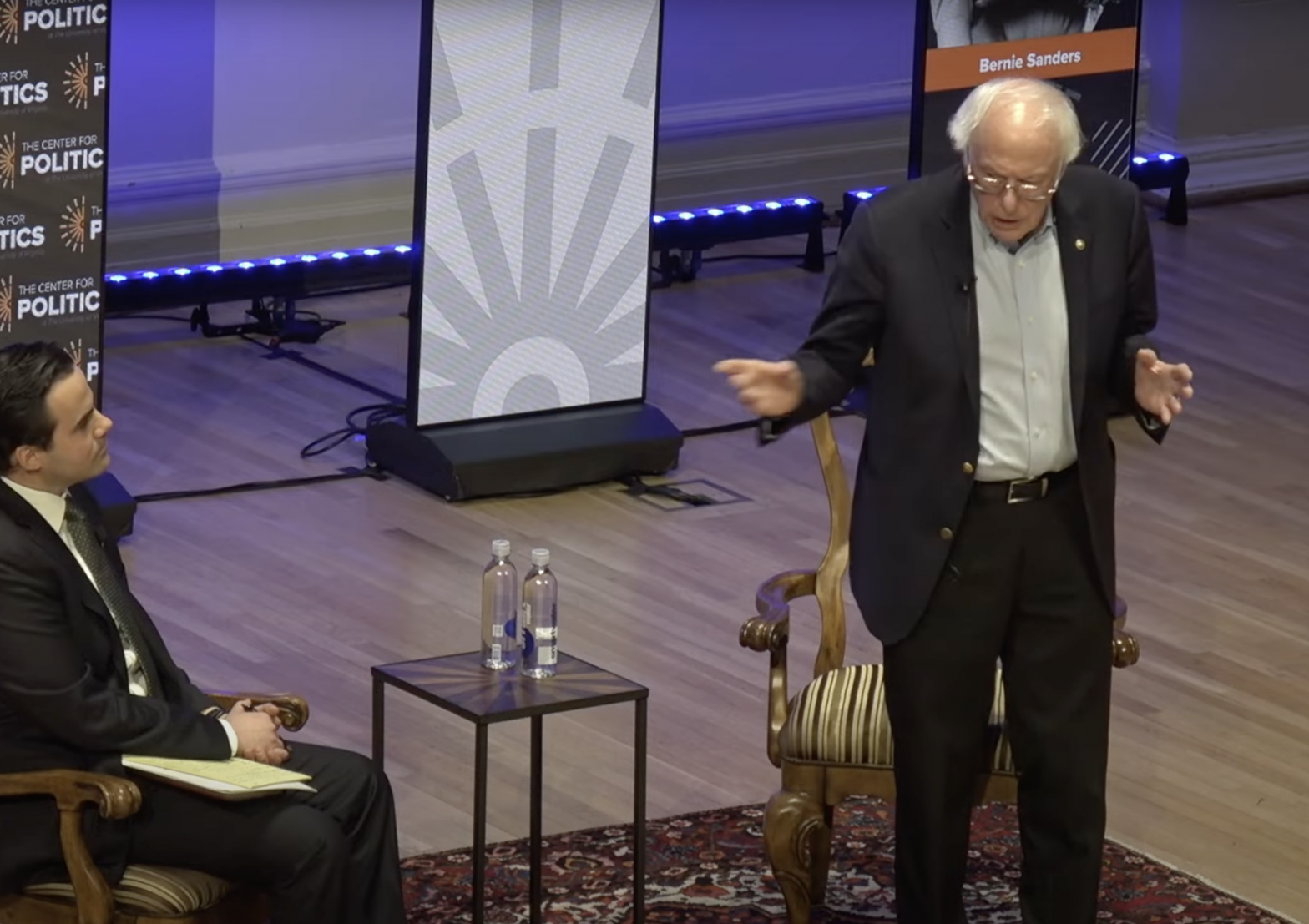When Sen. Bernie Sanders took the stage at the University of Virginia on March 2, he told the crowd that “real politics” is about understanding who’s winning in American society and which team is losing ground. To Sanders, the answer is plain to see: The top 1 percent is winning, and the working class is losing.
It’s a familiar refrain for the senator, and one that forms the thesis of his new book, It’s OK to Be Angry About Capitalism, which the senator had been invited to speak about at UVA as part of a promotional tour. The university’s Center for Politics organized the event, and put Sanders in conversation with interviewer and center resident scholar Robert Costa, who has worked as chief election and campaign correspondent for CBS News since 2022.
“There’s only one person who could stuff Old Cabell the day before spring break starts,” said Center for Politics Director Larry Sabato as he introduced Sanders.
Sanders is currently serving his third term in the U.S. Senate as the longest-sitting Independent member of Congress in American history. Before his three terms as senator, Sanders served for 16 years in the House of Representatives. He’s been steeped in American politics for a long time—long enough to write a book about what’s wrong with the system.
“I wanted to break through a lot of the irrelevant discussion that takes place regarding politics in America,” said Sanders.
In his book, Sanders argues that unfettered capitalism is undermining democracy, as it has caused an unprecedented level of income and wealth inequality. On his website, angryaboutcapitalism.com, the Vermont senator articulates that his book presents a vision for a society that provides a decent standard of living for all—”one that is not a utopian fantasy, but is democracy as we should know it.”
Costa and Sanders sat beside each other on stage, but that dynamic didn’t last long. Whenever Costa asked his guest a question, Sanders would stand up to deliver his answer to the audience. Each time, the crowd laughed. “You look like somebody who’s going to run again,” Costa joked.
Costa asked Sanders to explain the immorality of capitalism that he asserts in the book. The senator compared a kid robbing a 7-Eleven to the head of ExxonMobil, who knew that carbon emissions would have disastrous effects on the planet 60 years ago, but persisted in the business of fossil fuels in pursuit of profit. “Which crime is worse,” Sanders asked the crowd, “people who are knowingly destroying the planet for short-term profits or the kid who robs the 7-Eleven at gunpoint?”
In his reflections on student loan debt, Sanders referenced Franklin D. Roosevelt and his assertion that political rights are meaningless if the American people lack “economic rights.”
“You have power,” Sanders said. “You’ve got to run for office yourself—you have a right to say, ‘That is not right.’”
FDR wasn’t Sanders’ only influence; he also cited Martin Luther King Jr. as one of his heroes. He told the crowd that he was present for King’s “I Have a Dream” speech, and reminded everyone that the title of the event was March on Washington for Jobs and Freedom.
“King looked the establishment in the face,” he said, “and continued to fight.”
Costa asked Sanders if he would support Pres. Joe Biden in 2024. The senator, in discussing the American Rescue Plan, said that Biden was there “all the way” in supporting the progressive agenda. “I like and respect him,” Sanders said of the president.
Center for Politics interns were seated close to the stage and had prepared a few questions for Sanders. A first-year student asked him to assess whether economic issues or cultural issues had influenced voters’ preference for Trump in 2016.
“There are Trump supporters who are outright racists, sexists, homophobes,” said Sanders, “but there are many more who are not any of that—they are working-class people falling behind.”
“Nobody is talking to these people who are struggling. They are bitter and disappointed.”
Sanders claimed that he and his team were doing the opposite, by traveling the country and listening to the people whom Congress and the corporate media were ignoring.
The final student to ask a question asked the senator what he thought about burnout among young people, as social media and digital fatigue may prevent them from participating in politics and the upcoming election.
Sanders stood up once again.
“Let me be a hard ass,” he said. “You don’t have the right to be fatigued.”
The crowd gave him a standing ovation. “Change comes from the bottom up,” he said. “You are part of the struggle for justice.”
The event was recorded and can be watched via the Center for Politics YouTube channel at youtube.com/@UVaCFP.
